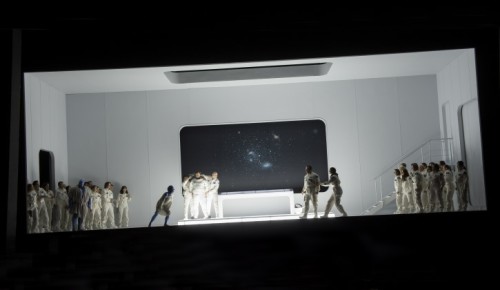 Germany Meyerbeer, L’Africaine: Soloists, Oper Frankfurt Chorus, Frankfurter Opern- und Museumorchester, / Antonello Manacorda (conductor). Opernhaus, Frankfurt, 2.3.2018. (JMI)
Germany Meyerbeer, L’Africaine: Soloists, Oper Frankfurt Chorus, Frankfurter Opern- und Museumorchester, / Antonello Manacorda (conductor). Opernhaus, Frankfurt, 2.3.2018. (JMI)

Production:
Director – Tobias Kratzer
Sets and Costumes – Rainer Sellmaier
Lighting – Jan Hartmann
Cast:
Selika – Claudia Mahnke
Vasco da Gama – Michael Spyres
Nelusko – Brian Mulligan
Ines – Kirsten MacKinnon
Don Pedro – Andreas Bauer
Don Diego – Thomas Faulkner
Inquisitor/Brahma Priest – Magnús Baldvinsson
Don Alvar – Michael McCown
Anna – Bianca Andrew
Giacomo Meyerbeer’s position is fairly unique in the history of opera. From having been the most popular composer in the first half of the nineteenth century, he has come to be ignored by most theatres today (in fact, there have been decades like this). It’s not that the public has turned their backs on him – the few performances of his works that are staged are generally well received.
L’Africaine has usually been performed in Germany under the title Vasco da Gama. The opera premiered one year after the death of the composer, who had worked on the score with the latter title. However, the premiere in Paris in 1865 took place with the title L’Africaine, and that is how it is generally known.
This new Frankfurt staging is by Tobias Kratzer, who had done Meyerbeer’s Les Huguenots in Nuremberg and Nice. In this case, he has moved the opera from the fifteenth century to the space age, as if da Gama’s geographical discoveries were taking place in other galaxies. These original ideas seem to work better in some operas than in others, and this is one of the less successful attempts: the libretto clearly indicates where and when the action takes place. Here, Vasco da Gama has become an astronaut on a space trip, while Selika and Nelusko are not the Africans specified in the libretto, but rather are creatures from another galaxy, painted blue and with crests. Is it meant to be a joke? Of course, it’s difficult to take it all seriously.
That said, I have to acknowledge that Tobias Kratzer’s stage work is remarkable, with admirable direction and some brilliant moments, as in Act III when the astronauts see their wives on screen, or in the entertaining spacewalk.
Conductor Antonello Manacorda’s reading was not particularly convincing; it was significantly less impressive than that of Enrique Mazzola just over two years ago at Berlin’s Deutsche Oper. It was all too monotonous and lacked inspiration. The version of the opera done here was quite complete, unlike the production a few years ago at La Fenice in Venice. The orchestra gave a solid performance, as did the chorus.
Selika, the (supposed) African of the opera’s title, was played by mezzo-soprano Claudia Mahnke, and she gave the best performance of the entire cast. On stage, she is clearly mistreated by the production, but she sang with gusto, and her attractive voice had sufficient amplitude.
Tenor Michael Spyres was Vasco da Gama, and he gave a fine performance, overcoming the difficulties of the score. For my taste, he is a bit light for the character; I prefer a more heroic voice, like those of tenors I’ve seen previously in the part, such as Gregory Kunde (Venice) and Roberto Alagna (Berlin).
Nelusko, the other space alien, was sung by baritone Brian Mulligan, who did well. His voice is good in the middle range, but it tends to be somewhat thinner at the top.
The part of Ines was covered by the young soprano Kirsten MacKinnon, who showed an attractive voice in the middle and easily hit the top notes, although here the colour of her voice changes somewhat.
In the secondary characters Andreas Bauer as Don Pedro was sonorous, and Thomas Faulkner was a correct Don Diego. Bass Magnús Baldvinsson doubled as the Inquisitor and Priest of Brahma. The Don Alvar of Michael McCown was commendable, as was Bianca Andrew in the part of Anna.
José M. Irurzun
